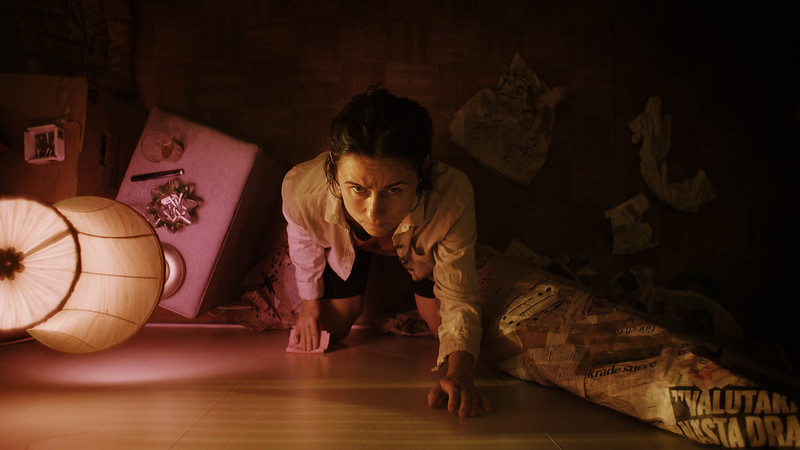What to Watch Verdict
Knocking is a slow burning psychological mind f*ck that will leave you disoriented and questioning
Pros
- +
✊🏻Cecilia Milocco.
- +
✊🏻Disruptive Score.
Cons
- -
✊🏻Abrupt third act shift.
- -
✊🏻Unresolved early narrative threads.
Knocking is part of our Sundance Film Festival coverage. You can find all of our reviews here.
This year's crop of films in the 2021 Sundance Film Festival Midnight section aren't likely to make a big splash in the mainstream, but there are a few notable conversation starters. Knocking, along with Censor, is certain to be one of them. Loosely base on a Swedish short story by Johann Theorins, Knocking follows Molly (Cecilia Milocco) as she tries to uncover the source of the strange knocking and cries for help she hears coming through the walls of her new home.
Molly's trying to rebuild her life after the tragic death of her partner. The loss pushed her so far into grief she ended up in a psychiatric facility. Still grief-stricken (but no longer quite so fragile) Molly leaves the facility after a prolonged stay to moves in to a new apartment. Soon after arriving, however, she starts hearing knocking. But none of her upstairs neighbors admit to making the noise. No tenants in the surrounding units hear the sound in their apartment. As Molly tries to reintegrate into society that knocking becomes first a mild irritation and then source of creeping unease.
This simple story slowly evolves into an journey inward. As the people around her become convinced she's unwell, Molly begins to fracture. The memories of not being able to save the woman she loved collide with her conviction that someone really is crying out for help in her building. Her attempts to investigate alienate the police and disturb her neighbors. An increasingly rattled, With no support system and the people around treating her like she's the problem, Molly begins to question her own reality. Digging in her heels and holding the line ultimately results in her taking drastic action that doesn't end well.
The film is riddled with misdirects, disruptive sounds, and a heavy dose of gaslighting and disrespect heaped in Molly's direction. Milocco's performance is a delicate balance of contradictions. Coupled with the stark production design and savvy camera work it sets a compelling stage. Her ability to physically convey deep emotion serves the plot well and does the majority of the heavy-lifting emotionally. This is a story reliant on silence and tension. Milocco's blend of vulnerability and quiet pain make it easy to buy-in and second guess everything. So, despite one-too-many needless misdirects, Knocking solidly builds a sense of dread and sows seeds of confusion.
This story's strength lies in the inconsistency of it all. Which makes the majority of the decisions towards the middle of the third act slightly disappointing. Kempff falls back on a few ineffective short film storytelling techniques, meant to convey a little in a short amount of time, that ultimately break the tension and bog down the plot in minutiae. Despite being only 78 minutes, there was time for a more balanced handling of ostracizing this character and leading to the final "delusion" and wrap up sequence. The incompleteness of the allegory undermines some of the film's good work in the lead up.
Believe women. Easy to say, harder to convince people to do. Society trains people to treat mental a breakdown as justification to act as though that person is irrational or can be safely to discounted. Knocking isn't completely successful in threading the needle with its metaphor for treating every mental crisis like a mental illness but it admirably — if silently — reads filmmakers for filth in how they leverages the archetypical signs of paranoid psychosis like a bully club by reinserting reasonableness into the conversation. Context is never wanting in this storyline...which is a pointed bit of shade all its own. It's the interpretation that's questionable.
But, the visual narrative needed more "regular" outings to juxtapose against Molly's growing delusions and less reference to her increasing despondency. The character's isolation isn't in question. But muddying the waters and raising questions about her credibility would've been better served by reducing the number of flashbacks to her girlfriend and building up her life and anchoring her contradictory relationships with the building's inhabitants (particularly the landlord) in a broader oasis of calm leading up to her desperate actions that bring everything to a head.
Frida Kempff's Knocking is a timely — and pointed — reminder that continuing to believe in (and advocate for) yourself can be a matter of life or death. Beneath all the atmosphere and stylish cinematography is a commentary on the inadequacies of how we communicate and respect women occasionally made more poignant because of the film's imperfections.
Ro is a Rotten Tomatoes approved film/tv critic, writer and host on several of the MTR Network's podcasts. She's a member of the San Diego Film Critics Society and the Online Association of Female Film Critics. She's a former culture columnist for San Diego CityBeat (may it rest in peace) with a serious addiction to genre fiction, horror and documentaries. You can find her sharing movie and book recs and random thoughts, on her podcast I Talk Sh!t and Read or in her newsletter, Shelf Envy.












